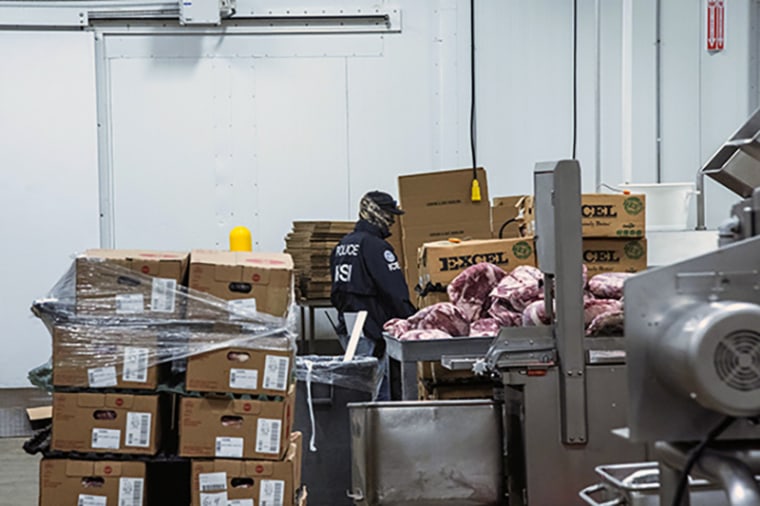In Nebraska, the state’s largest worksite immigration raid sent a chilling effect across the city of Omaha this month when federal immigration authorities arrested 76 employees of a meatpacking plant.
About a dozen of them have already been deported or transferred to out-of-state custody. Sixty-three others remain in immigration custody at the Lincoln County Detention Center in Nebraska.
Federal authorities accuse the workers of using stolen identities from U.S. citizens to unlawfully gain employment at Glenn Valley Foods, a meatpacking plant that has been processing boxed beef for more than 15 years.
The Center for Immigrant Refugee and Advancement, an immigrant rights organization in Omaha, provided legal consultations to most of them.
Anne Wurth, the group’s associate legal director, told NBC News they are “honest, hardworking individuals in our community” who have also been victims of an immigration system that “does not provide enough pathways” to remain in the country legally.
“That’s not true,” said Elhrick Cerdan, the assistant special agent in charge of Homeland Security Investigations in Nebraska, who led the enforcement operation at Glenn Valley Foods.
In an interview, Cerdan rejected “this narrative that these hardworking illegal immigrants were just doing their daily job and trying to earn wages.”
“They were stealing the identities of over a hundred U.S. citizens,” Cerdan said.
Seven people have been charged in connection with the events surrounding the raid at Glenn Valley Foods. Only one of them faces charges of using someone else’s Social Security number, court records showed as of Wednesday.
“That number could change,” Cerdan said, because the investigation continues.

Four protesters, including two U.S. citizens who worked at the plant, face charges accusing them of jumping on law enforcement vehicles as they escorted detainees out of the facility, according to court records.
A Honduran national was charged with resisting arrest and displaying a box cutter when agents tried to apprehend him. A Mexican national is charged with unlawful re-entry into the United States. An employee who was arrested was charged with false representation of a Social Security number.
The rest of the detainees face immigration proceedings, according to Cerdan and Wurth.
“Those individuals are still in detention, and they’re sitting there waiting for their day in court,” Wurth said, adding that many of them have bond hearings scheduled for next month.
Inside the Homeland Security operation
Cerdan had been investigating a large-scale identity theft scheme in Omaha for three months when he showed up at Glenn Valley Foods on June 10 to execute a civil search warrant alongside dozens of other federal officers.
“That day, the biggest concern was officer safety and the safety of the people in that location, whether they were victims, criminals or witnesses,” Cerdan said in a video call Monday. “That’s why we had an overwhelming number of federal, state and local law enforcement present there.”
Asked how the alleged identity fraud scheme worked, Cerdan declined to provide specific details to protect his investigation. But generally, he said, victims of identity theft lose their information through spam texts, phone calls and emails, as well as illegitimate websites posing as banks or cyberattacks. Often, the information is sold online or on the dark web by a broker or a “dealer of stolen identities,” he said.

Four videos from inside the meat processing facility obtained by NBC News show several agents with their faces covered, wearing tactical gear and asking people for their immigration papers or proof of U.S. citizenship in Spanish. Workers are on edge and scared as some of their colleagues are put in handcuffs and escorted out.
Two other videos from outside Glenn Valley Foods obtained by NBC News show groups of officers, agents and law enforcement vehicles surrounding the plant. The videos also capture family members showing up at the facility to bring documents on behalf of their relatives. Protesters also show up.
It took federal authorities four hours to safely conduct employment authorization audits of every worker at the plant, according to Cerdan and the U.S. attorney’s office in Nebraska.
Homeland Security agents identified 76 employees at Glenn Valley Foods who lacked valid work authorizations, according to the U.S. attorney’s office. “These workers were using Social Security numbers that had not been issued to them,” U.S. Attorney Lesley A. Woods said.
Based on the findings of the audit, “a large number of suspected fraudulent identification documents” was uncovered, Woods said. “Multiple identities of United States citizens were being fraudulently used by workers at that location.”
Cerdan said workers at Glenn Valley Foods were using the identities of 100 U.S. citizens — most of them of Latino heritage and from multiple states.
“These victims have experienced tremendous loss because of reported wages that they did not earn,” he said.
Cerdan said some victims lost federal student aid, as well as disability and health insurance benefits, because “all of a sudden they’ve made too much income.” Others had unpaid parking and speeding tickets that didn’t belong to them recorded on their driver’s licenses, Cerdan said. Others are being charged taxes “after their income was falsely increased,” according to the Department of Homeland Security.
Every employee at Glenn Valley Foods, including those who were detained, was approved through E-Verify, the company’s president, Chad Hartmann, told NBC News.
DHS operates the E-Verify system in partnership with the Social Security Administration to let employers know whether prospective employees have legal authorization to work in the United States.
“That system doesn’t capture a solution if somebody’s got a fake ID. That’s what needs to be repaired,” Hartmann said this month.
Cerdan declined to respond to Hartmann’s comment, saying E-Verify is run by Immigration and Citizenship Services, another office within DHS.
Wurth said “it indicates a larger conversation that still needs to be had about reform of the immigration system,” particularly when it comes to work permits in industries that rely heavily on immigrant labor.
Cerdan said his investigation will continue with a focus on identifying more victims, as well as brokers who may have sold the identities to workers at Glenn Valley Foods.

